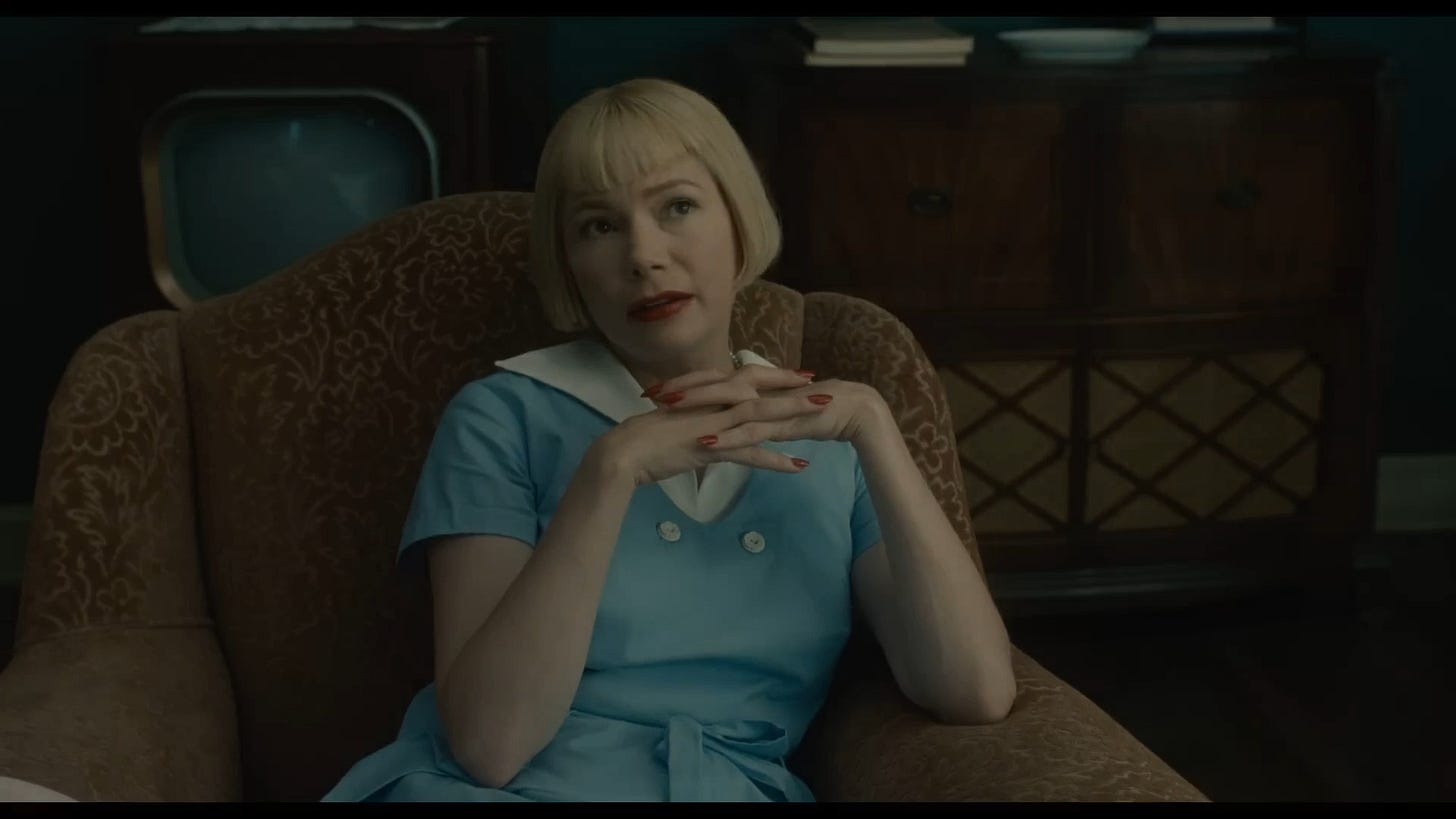manic pixie dream mom: a mostly spoiler-less ode to being a bad person
on Steven Spielberg’s new movie, which I loved way more than I expected to.
I wanna talk about Michelle Williams in The Fabelmans.
She plays the manic pixie dream mom, Mitzi Fabelman. Mitzi matches her lipstick with signature chili red nails, talks in a vaguely transatlantic lilt, adopts a pet monkey to cheer herself up, and, in the movie’s first half-hour, straight-up drives her children into the eye of a tornado to sit there in the car and have a crying breakdown. (I watched this scene with ill-disguised disgust and Emory was like, “Stop making that face.” Which, fair, because I was in a really judgy mood. But also, Mitzi, recognize that dangerous weather patterns don’t give a fuck about making you and your kids part of a death toll!)
Anyway, I loved watching Mitzi, mostly because of how much she grated on me as a self-identified self-hating artiste. Because she doesn’t hate herself. She hates her life, which in a mom we judge as unforgivable.
In one of my favorite scenes, Mitzi waxes poetic on a family camping trip about how much she loves Arizona — indirectly signaling to her husband Paul Dano that his latent dream of moving to California, where the big work is for engineers like himself, will not be happening, passive aggressive queen — and then performs a little ballet solo in front of the campfire, silhouetted in car headlights.
But she’s wearing a white dress that turns see-through when back-lit, and her teen daughter starts yelling at her that people can see her body, trying to block her dance from view.
It’s this gorgeously strange, strangely gorgeous moment of teen angst and discomfort, leveled at a mother who’s blissfully ignoring her daughter-as-convention in her determination to perform. Which would suck, if that was your mom. But which would also, maybe somewhere down the line when you’re more able to absorb the experience, inspire.
Part of the genius of Mitzi’s story, I think, is that while she has the demonstrative, audience-seeking personality, their life has been constructed toward her husband’s life-purpose. She cares for the kids to support his inventive, machine-loving brain. They move states for his job more than once. He is a tender, compassionate man, not at all the toxically masculine trope one might expect from a father of the fifties. But, not least because his work makes the money, his needs are still the implicit priority.
Mitzi’s existential dissatisfaction, borne from the piano performance career she never had, turns her selfish and frequently manipulative: two traits that are in direct conflict with being a good mother. She clearly loves her kids. From the earliest days, she watches the movies created by Sammy (our Spielberg stand-in) utterly enraptured. She recognizes his desire to film and advocates fiercely for him. But her love for her own mind, creative spirit, and spiritually fulfilling relationships is what gives her life, in the end. When she does something because she should — like moving to California for that sweet, sweet husband’s career — she can’t even get out of bed.
In my favorite English class I ever took, my professor told us that the most important thing for us to take away after the semester’s end was the capacity to make the “fullest” choice rather than the “right” choice, if and when that crossroads came.
Damn, has that stuck with me. And watching The Fabelmans, it was echoing in my head again. I finished the movie and I wrote in my Notes app: The cardinal rule of all things is that people will hurt others to do what’s right for them — said another way, for love — and it’s not a matter of obligation, and it’s not a matter of “should.” It’s just what is.
I recommend The Fabelmans on a lot of levels. It’s a love letter to art-making and family and the tensions between the two. It’s shot beautifully. And most of all, Mitzi’s story is gentle, painful permission to be bad, sometimes, in service of being honest.
Thanks for reading, happy Friday, all the love,
Kate



